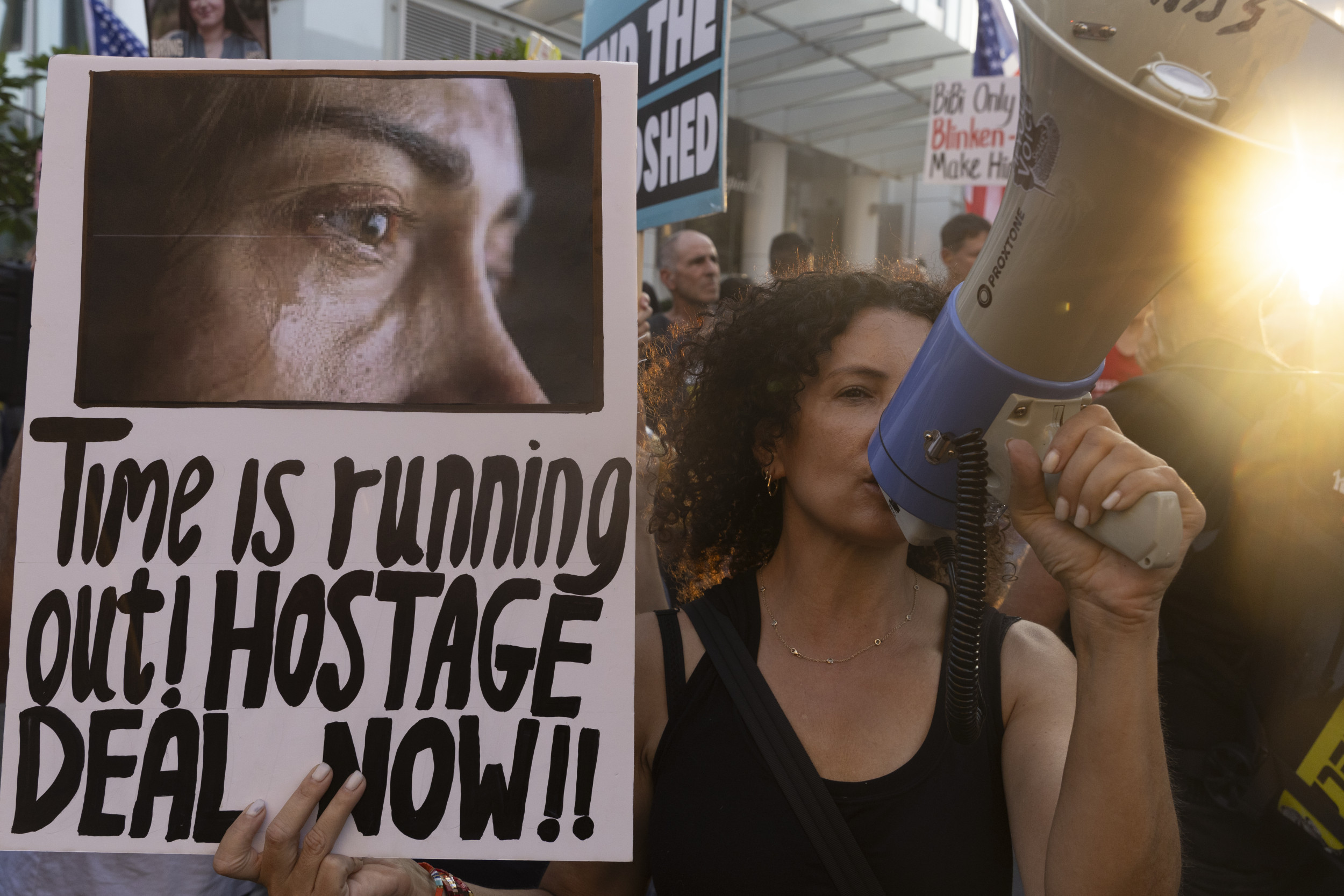The Israeli political calendar has brought Israeli Prime Minister Benjamin Netanyahu a rare opportunity to get a hostage deal done with Hamas. A two-month recess of the country’s parliament, the Knesset, means he may be able to eat his cake (free the hostages) and have it, too (keep his job).
On Monday, Israeli soldiers brought back to Israel the bodies of six male hostages who had been taken by Hamas terrorists from their homes in Israel on Oct. 7. After 10 agonizing months, Israel finally brought them home—not to be reunited with their families, but to be laid to rest in the soil of the nation that had failed to protect them.
The operation, which the Israel Defense Forces (IDF) said was complex and based on intelligence, came just as another round of negotiations between Israel and Hamas had broken down in Qatar, failing to achieve a deal that would see the remaining 109 hostages held in Gaza return to Israel.
Amir Levy/Getty Images
The message is clear: time is not on the side of these captives. Every day they remain in Hamas’s grip, the odds of their survival diminish.
The hostages brought back to Israel on Monday—Alex Dancyg, 75, Yagev Buchshtav, 35, Chaim Peri, 79, Yoram Metzger, 80, Nadav Popplewell, 51, and Avraham Munder, 78—were all taken alive on Oct. 7. While two were declared dead by the IDF in June and another two in July, at least one of them—Munder—was believed to be alive. How they all died, remains unclear.
After 10 months in captivity, there is no argument that the hostages need to come home. They were abandoned by the state, and it is the government’s responsibility to bring them back. But the question that haunts every discussion in the Israeli government is: at what cost? How far should Israel go to secure their release, and when does the price become too high, the risk too great?
Netanyahu has laid out three conditions: no permanent ceasefire; the right to resume hostilities if necessary; maintaining an IDF presence in the Philadelphi Corridor—the critical stretch of land between Gaza and Egypt that Hamas uses to smuggle weapons—and ensuring the release of the maximum number of hostages in the first phase of any deal.
Each of these conditions serves a strategic purpose. Refusing a full ceasefire allows Netanyahu to keep his coalition intact—its members would splinter if the war were declared over—and preserves Israel’s ability to continue its operations against Hamas, ensuring that the terrorist organization cannot reestablish its control over Gaza. Hamas, as an ideology, will persist after the war, but the possibility of further military action is essential to make sure it can no longer rule.
The Philadelphi Corridor is a linchpin in this strategy. Over the past 10 months, Israel has inflicted significant damage on Hamas’s military infrastructure. But to prevent Hamas from rebuilding, Israel must choke off its supply lines, ensuring that no new shipments of weapons can reach the group. This is crucial to avoiding another war and securing Israel’s safety.
And then, there is the demand for more hostages to be released in the initial stage of the deal than Hamas wants. One of the challenges Israel deals with is that Hamas refuses to reveal exactly which hostages are alive and which ones it will release. Israel has relatively good intelligence on the hostages, but that does not mean it knows everything and as we saw in November, during the last hostage release, Israel did not know until a few hours before which hostages would be set free that day.
There is another side to all of this, and that is the way Netanyahu has dragged his feet throughout the war in reaching a deal. In contrast to the way some members of his coalition talk about the hostages, what the prime minister needs to understand is that their return is part of the victory that Israel seeks in this war. If they do not come home, Israel will never be able to heal and will never be able to move on. Instead, Oct. 7 will remain an open wound for most Israelis.
While Netanyahu likely desires a deal, his actions suggest a man torn between two goals: securing the hostages and maintaining his coalition. His far-right partners, Bezalel Smotrich and Itamar Ben-Gvir, have made it clear that they will abandon the government if the war ends with Hamas still in control of Gaza.
Threading this needle is not simple, but Netanyahu does have a window right now that he should not miss. The Knesset, Israel’s parliament, is currently on recess until the end of October. What that means is that effectively, Smotrich and Ben-Gvir have no real way to bring down the coalition since the only way to do so would be to pass a bill in the Knesset that dissolves the parliament. They can only do that once the Knesset returns in two months.
What this means is that if he reaches a deal now, he can, at a minimum, see through the first two phases—one immediately and another in six weeks – that would see most of the hostages released. Smotrich and Ben-Gvir will threaten and warn that they will bring down the coalition, but it will remain an empty threat until the end of October. By then, depending on what happens, it is possible that Israel will already be back in Gaza fighting Hamas, giving the extremists no reason to follow through on their threats.
Time is running out for the hostages. Netanyahu needs to decide now.
Yaakov Katz is a senior fellow at JPPI, a global think tank for the Jewish people, and the author of Shadow Strike: Inside Israel’s Secret Mission to Eliminate Syrian Nuclear Power and Weapon Wizards: How Israel Became a High-Tech Military Superpower.
The views expressed in this article are the writer’s own.
